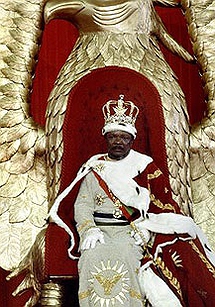به ازای هر نفری که با دعوت شما در منظوم ثبتنام میکنند 20 امتیاز میگیرید.
لینک دعوت:


He rose through the army ranks rather quickly and was promoted to sergeant major in less than two years. He took part in the capture of the city of Brazzaville from the Vichy and German forces, and in 1944 he was transferred to France, where he saw combat for the next year. After war's end he stayed in the army and was posted to what was then French Indochina, where he took part in operations against Viet Minh guerrillas in Saigon. He was awarded several medals for bravery by the French government for his actions in these battles. He was later transferred back to Brazzaville and was promoted to lieutenant, then eventually captain. When the French colony of Ubangi-Shari was granted independence in 1960 it took the name of Central African Republic, and two years later Bokassa left the French army to join the army of the CAR, eventually being promoted to colonel and appointed to head the army by the country's president, David Dacko, who was also his cousin.
Family ties, however, did not prevent tensions between Bokassa and Dacko. The country was in turmoil because of poverty, constant invasions by rebels from neighboring countries and rampant corruption by local and national government officials. Matters between Bokassa and Dacko came to a head in December of 1965, and Bokassa finally led a coup that unseated Dacko. He took control of the country on January 1, 1966, dissolving Parliament and promising elections "soon". Conditions in the country improved a bit at first, but that didn't last long and the country sank back into corruption and poverty, not helped by Bokassa's extravagant spending of what little money the country's treasury had. He narrowly missed being deposed in a coup organized by dissident troops in 1969. He was so angered by this that he reportedly had the coup's ringleader--a former army colleague and cabinet minister--brought before him, and Bokassa personally killed him.
In 1972 Bokassa declared himself president for life (and again narrowly avoided being by overthrown in a coup, in 1974). In 1977 he declared himself Emperor Bokassa and changed the name of the country to the Central African Empire, and had himself crowned in a gaudy, lavish coronation ceremony that cost, by most estimates, about $20 million--meanwhile, people outside the capital of the impoverished country were dying of starvation and disease. Conditions in the country became so bad and Bokassa's rule became so erratic and oppressive that France finally withdrew support from his regime, and in a rage Bokassa turned to Libyan dictator Muammar Gadaffi for support. In an effort to secure that support Bokassa converted to Islam and changed his name to Salah Eddine Ahmed Bokassa, but he "reconverted" back to Catholicism and went back to using his own name when funds promised by Gadaffi never materialized.
In 1979 food riots erupted in the capital and Bokassa's forces opened fire on protesters, killing hundreds. In April of that year his government arrested hundreds of schoolchildren who refused to buy uniforms with Bokassa's picture sewn on them, as required by government edict. The children were thrown in prison and about 100 either died of suffocation when squeezed into crowded jail cells or were beaten to death by guards (and, according to some reporters, Bokassa himself, who was known to participate in executions he had ordered).
The incident caused international outrage. Bokassa's regime became even more repressive, and in September of that year French troops invaded the country in an operation to overthrow Bokassa and install former president Dacko. Bokassa escaped the country, fleeing by airplane to the Ivory Coast. He lived in exile there for four years before moving to France. In 1986 he flew back to the Central African Republic. He was immediately arrested--he had been tried in absentia by the new government and sentenced to death in 1980--and soon placed on trial. He was found guilty and sentenced to death again, but it was commuted by President Andre Kolingba to life in solitary confinement, and later to 20 years. Bokassa was released in 1993 during a general amnesty.
He died in Bangui, Central African Republic, in 1996 of a heart attack.